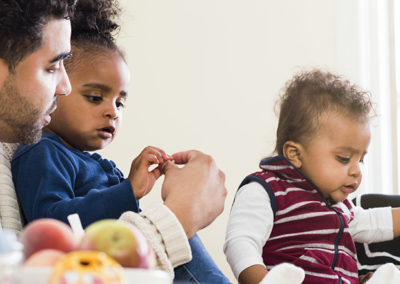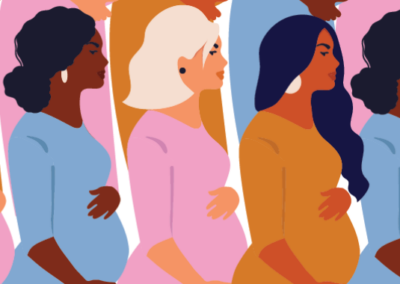Investing in Doula Mental Health is an Investment in Positive Birth Outcomes


Doulas play a critical role in improving maternal health outcomes and maternal health organizations and funders remain focused on supporting this crucial workforce. Access to doula care improves maternal health outcomes and mitigates the related inequities that disproportionately impact communities of color. But what’s just as important, and often missed, is the impact of investing in doula’s mental health and overall well-being.
Doulas play a vital role in supporting birthing and postpartum people by providing a wide range of services – including significant emotional support. Serving as a doula often involves engaging with clients burdens and challenges on a deep and personal level, and requires the capacity to create open, vulnerable, safe and trusted relationships with their clients. For many doulas, this emotionally demanding work is greatly rewarding, but can also negatively impact their mental health, cause burnout and decrease workforce sustainability. To better support this critical workforce, maternal health groups and related organizations can and should play a meaningful role in supporting doula’s mental health and well-being.
In our work as the backbone organization of the New York Coalition for Doula Access (NYCDA), a coalition of doulas and supportive allies from across New York State, doulas expressed interest in access to a safe space where they could discuss their experiences and build community. The Coalition’s response was to create and launch the NYCDA Healing Space, a monthly, intimate meeting for doulas to share their experiences, resources, and concerns, while providing each other peer-to-peer support. Doulas who attend the NYCDA healing space have expressed that this space helped with feelings of isolation and secondary trauma that can come from this work and can be difficult for doulas to navigate and process on their own.
The Healing Space was fully designed by doula members, who shared what they wanted from these meetings and what that space should look like. This included the importance of confidentiality to feel safe when being open and vulnerable, the ability to share resources to help them learn how to gain clients, navigate the work, access training and doula courses, as well as how to be proactive in their well-being. Doulas also felt moved to share and process the emotional aspects of the births they supported, celebrate successes and grieve losses, and navigate professional, technical and clinical challenges.
Each meeting begins with community agreements, a set of guiding principles, which are meant to level set and remind members that we welcome difficult conversations while remaining respectful and mindful of lived experiences. We also go over our healing space agreements, which keeps us accountable and reminds us that the experiences shared are to remain confidential, helping to further create a safe space. Monthly meetings are loosely planned, and members are engaged in conversation by prompt questions or organic free flowing topics of discussion based on the needs of our members. One of our doulas had expressed that “NYCDA Healing Space Feels like group therapy.” Doulas feel this style works for them because it takes away from the formality they experience in the work and daily lives. Members appreciate that they can express raw experiences without restrictions.
One of our members shared that “Doulas need spaces like these to just vent and talk.” Healing Space topics have ranged from burnout and its causes, to financial well-being, especially given the limits on Medicaid reimbursement, and to challenges with funding for doulas as part of maternal health care teams. Many doulas, while deeply committed to the field, expressed concern about their ability to stay in the workforce without a living wage. This is a concern for both current doulas and for the future of doula work, especially for those who are community-based and work in under-resourced communities. Spaces like the NYCDA Healing Space are critical to motivate doulas to both join and stay in the workforce and offer a safe, community-driven environment.
Looking forward, our focus for 2025 is to talk through what workforce sustainability looks like for doulas. In previous meetings, discussions have touched on the need for mental and physical well-being for doulas and investment in their health so that they can continue to do the work for years to come. Doulas have also expressed interest in supporting policy implementation efforts and providing education on what doulas do so there is more collaborative work between providers and doulas. Doulas are frontline workers and it is important that their needs are met in order for there to be longevity and retention of the work that greatly impacts positive outcomes in maternal health across the country.
Many doulas agree that their job is the work of the heart, and whether emotional or physical, the heart needs care. Maternal health organizations and funders need to further invest in doula mental health and well-being, especially healing spaces which will help doulas feel supported and valued and seen as part of the maternal health line of professionals, who are all working towards the best maternal health outcomes. These investments are not only important — but necessary, as healing spaces will help sustain the future of this crucial workforce.
We are deeply passionate about our work in maternal health and with doulas, so if you would like to learn more or get involved, please reach out to Maris Gelman and Jennifer Gonzalez .




